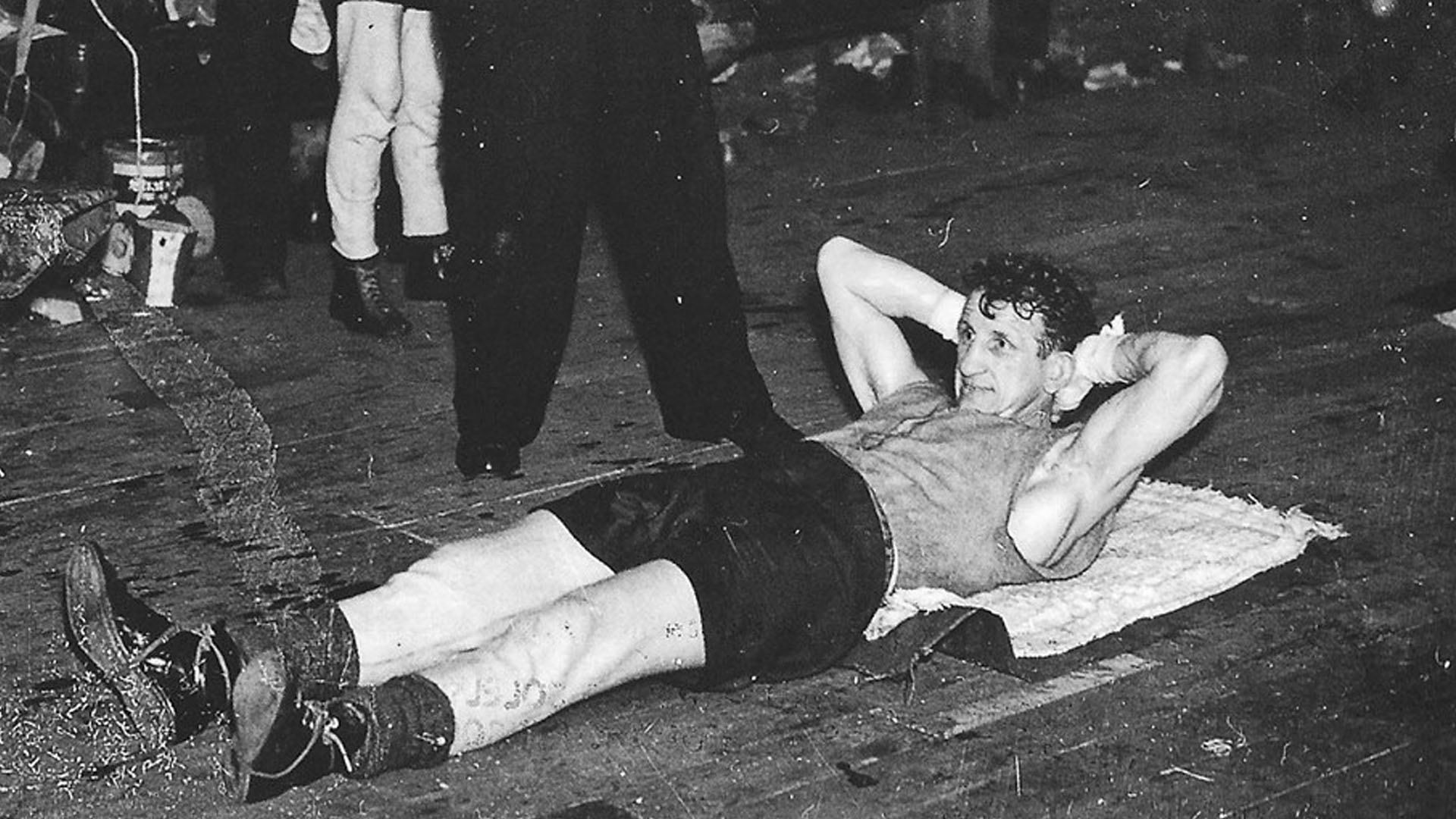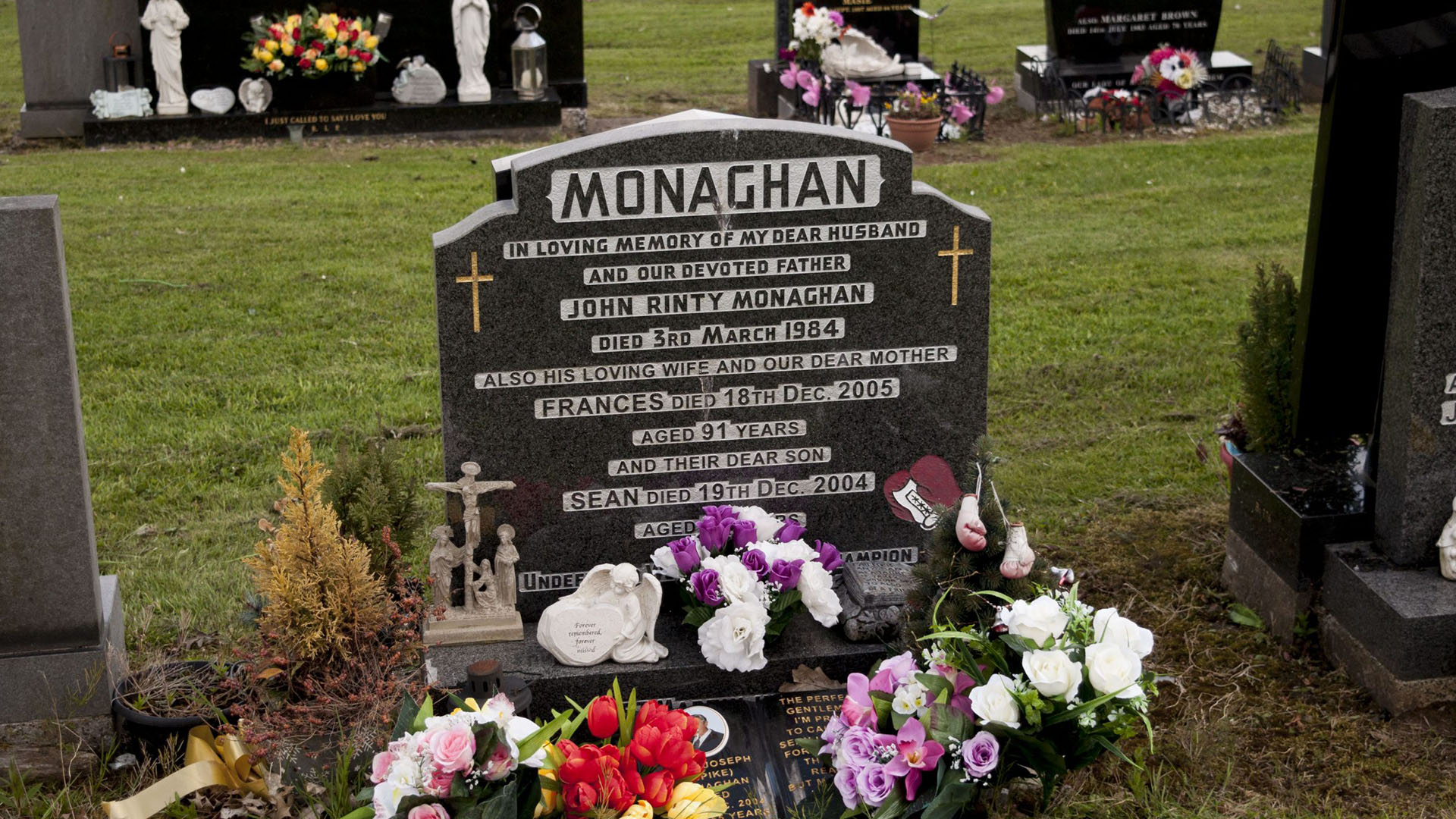John Joseph Monaghan, known to all as Rinty Monaghan was Belfast's first world champion boxer. He was born on 21st August 1918 at 23 Lancaster Street, Belfast and grew up in North Belfast near the docks. He attended St Patrick's Christian Brothers' School on Donegall Street in the city. It was there he first took part in street fighting contests. He would win a fish supper for each victory. By the time Monaghan was fourteen, he was picking up a few shillings per win and was on his way to professionalism.
In his mid-teens, Rinty turned professional and trained in a gym on Belfast’s Hardinge Street. In 1938, he married Frances Thompson and the couple moved to Little Corporation Street in Belfast’s Sailortown. They raised three daughters, Martha, Rosetta, and Colette, and a son, Sean. Rinty lived in and around the Sailortown district for the rest of his life.
According to his daughter Martha, Monaghan would befriend stray dogs as a young man, and he was a fan of the heroic movie pooch Rin Tin Tin. It’s thought this canine film star of the 1920s earned the young Belfast boy the nickname Rinty. Others suggest the name came later due to his nimble footwork in the ring.
Rinty Monaghan rose through the ranks of professional boxing in the years before the outbreak of the Second World War. He remained undefeated until a knock-out from Glaswegian Jackie Paterson in 1938. That was 25 fights into his professional career. While that was a temporary setback, the start of the Second World War and service with the Royal Navy would put boxing on hold for the next few years.
Rinty's War Years
The Second World War interrupted Monaghan’s burgeoning boxing career. Despite his fighting reputation, Rinty never saw frontline service during the conflict. The Royal Navy instead decided to use Monaghan’s crowd-pleasing skills to motivate troops. When not boxing in Belfast, Rinty had become well-known as a song and dance man – an all-round entertainer. After each fight, he would sing “When Irish Eyes Are Smiling” to the delight of his fans. It was this side of “The Singing Irishman”, which saw him visit Norway and Gibraltar amongst other places during the early years of the Second World War.
He would go on to appear on stages with some of the greats of the period including Vera Lynn, Gracie Fields, and George Formby. Indeed, only 48 hours after D-Day, Rinty Monaghan arrived in Normandy to entertain beleaguered troops.
The Return to Belfast
After the war, Rinty went on to form a band. Performances in the Gaumount Cinema on Belfast’s Castle Lane, before the movie matinée saw him crack jokes. He would also entertain the crowd with renditions of popular songs like ‘Popeye The Sailor Man’. As well as singing, Rinty was remembered for his comedic acting including a sketch on the ‘Charge Of The Light Brigade’. But on his return to Belfast, it was his boxing that drew the largest crowds, particularly to the city’s King’s Hall.
Entertainment goes on trial
On 29th November 1947, a month after Monaghan became World Champion, the courts at Warrenpoint heard an interesting case. Mr. J.R. Wilson heard the prosecution as three men failed to make entertainment duty returns to the Ministry of Finance. The offending event was a Grand Carnival Dance in Warrenpoint Town Hall, Co. Down on 5th August 1947. The alleged main draws were World Featherweight Champion Rinty Monaghan and All Ireland Champion Ballroom Dancer Sammy Leckie. Around 500 people attended the night. On buying a ticket a constable noticed there were no entertainment duty stamps on the £5 ticket.
It was one of the first cases of its kind in Northern Ireland. The case proved difficult for the prosecution to determine how many people were there to dance and how many to see the star attractions. A total penalty of £20 with £5-13s-0d costs was imposed.
In the ring with Rinty
Monaghan managed to fit in a few fights between 1939 and 1945. By November 1945, Rinty had hung up his Royal Navy uniform and was back in full training in Belfast. His next victory was over Eddie ‘Bunty’ Doran for the Ulster Flyweight Title. The next target was the World Title held by London’s Terry Allen. Monaghan clinched that in October 1947, knocking the Englishman out in the first round in the King’s Hall. At the end of 1947, he gained revenge for an earlier defeat at the hands of Dado Marino in Harringay Stadium and secured the N.B.A. Flyweight Title.
Monaghan retained the World Flyweight Title in March 1948 defeating old rival Jackie Paterson. The Scot suffered a knockout blow in the seventh round much to the delight of the Belfast crowd. Monaghan became undisputed British, Commonwealth, and World Flyweight Champion. It’s thought he was the first Northern Irish person to hold the world title.
When asked for the secret of his success, Monaghan reportedly attributed it to a diet of goat’s milk and raw eggs in the run-up to the fight. With the semi-conscious Paterson carried from the ring, thousands of supporters celebrated. Celebratory bonfires were lit in York Street and Corporation Street. Monaghan had a fight on his hands once again, this time to get home through the partying crowds.
In April 1946, Monaghan retained his world title and added the European Flyweight title to it. In this instance, he claimed a hometown win over French opponent Maurice Sandeyron. The following September saw him draw with Terry Allen in Belfast. He still held onto his hard earned titles.
Boxing is in the fabric, and no doubt, in the D.N.A. of this city. Belfast, as a city, in boxing terms, always punches well above its weight. It’s a sport we’re very proud of and it’s a very important part of our sporting heritage.
Arder Carson – Lord Mayor of Belfast, 2015
By this stage of Monaghan’s career, aged 32 years old, he was diagnosed with bronchitis, a chronic lung and sinus condition. He renounced his titles and retired undefeated in April 1950. Some years later, he mounted a comeback but a professional license was refused. On retirement, his trophy cabinet held British, European, Commonwealth, and World titles. His sixteen-year professional career saw him fight sixty-six bouts. Of those, he won fifty-one, drew six, and suffered only nine defeats.
Life outside the Ring
Like many big names from Northern Ireland, Rinty Monaghan’s life out of the spotlight was not an easy one. For winning the world title, he received £3,500. The stories suggest he bought a radiogram and a three-piece suite, which took up almost all the front room of his small terraced house. Throughout his boxing career, he made good money but not the life-changing amounts that today’s stars earn. He received some poor financial advice and squandered much of his winnings. Undefeated in the ring, the taxman was to be Rinty’s fiercest opponent forcing him to work a succession of low-paid jobs for the rest of his life.
He would continue to sing and entertain. He would also attempt to break into the worlds of greyhound racing and amateur snooker. Other jobs included driving taxis, lorries and working as a petrol pump attendant. Through it all, he remained true to his working-class roots and was philosophical about his highs and lows. He remained a much-loved figure around the city for the rest of his days.
Until his death, Rinty remained a character around Belfast, often seen singing, tap-dancing or playing mouth-organ. Once he even entertained a train full of former boxers and friends for a six-hour journey to Cork. In 1976, a local radio station mistakenly announced his death. Monaghan phoned the station and corrected them with a laugh and “I’m not floored yet.”
In the following years, his respiratory problems continued and on 3rd March 1984 Rinty died as a result of complications from lung cancer. He was 65 years old. At the time of his death, he was still living in Little Corporation Street, only a stone’s throw away from Belfast’s docks. His grave is in Glenalina Extension G1, Grave 203, Belfast City Cemetery. The headstone features etched boxing gloves and the inscription “Undefeated World Flyweight Champion”.
On 3rd May 2007, Ulster History Circle unveiled a Blue Circle plaque to commemorate Monaghan and his achievements. With family and friends of the hometown hero in attendance, the plaque was put on permanent display at Belfast’s King’s Hall. The venue, of course, was the scene of many of Rinty’s most famous victories.
Belfast City Council also unveiled a three-metre high bronze statue of Rinty Monaghan in the city centre on 20th August 2015. The sculpture stands in Buoy Park next to the Cathedral Gardens. Scottish sculptor Alan Beattie Herriot won the commission to design and complete the artwork. At the unveiling of the statue, the Monaghan family was joined by boxing fans, councilors, and celebrities from the world of boxing.
Boxing is a sport now where it’s full of alphabet titles and no-one really knows who the world champion is. When Rinty was the world champion, there only was one and everyone knew him. I think, not only me, but the whole of Belfast kind of owes something back to boxing and people like Rinty for doing so much for the community.
Carl Frampton – IBF Super-Bantamweight Champion – 2015
As well as these permanent reminders, the legacy of Belfast’s undefeated world champion lives on in the memories and stories. While best remembered for his exploits in the ring, his bravery in venturing into the unknown theatre of war should not be forgotten.


